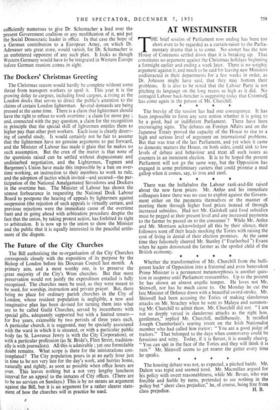AT WESTMINSTER T HE brief session of Parliament now ending has
been too short even to be regarded as a curtain-raiser to the Parlia- mentary drama that is to come. No sooner has the new House of Commons settled down than it is breaking up. That constitutes no argument against the Christmas holidays beginning a fortnight earlier and ending a week later. There is no weighty argument against it, and much to be said for leaving new Ministers undistracted in their departments for a few weeks in order, as Dr. Johnson might have said, that they may bottom their problems. It is also to be noted that the Labour Party is not pitching its language on the long recess as high as it did. No outraged Labour back-bencher is suggesting today that Cromwell has come again in the person of Mr. Churchill. * * * * The brevity of the session has had one consequence. It has been impossible to form any sure notion whether it is going to be a good, bad or indifferent Parliament. There have been encouraging signs. The debates on Foreign Affairs and on the Japanese Treaty proved the capacity of the House to rise to a high and serious level of argument on international problems. But that was true of the last Parliament, and yet when it came to domestic matters the House, on both sides, could sink to low levels of debate and behaviour and treat all such issues as counters in an imminent election. It is to be hoped the present Parliament will not go the same way, but the Opposition has engaged in some preliminary canters that could promise a mad gallop when it comes, say, to iron and steel.
* * * * There was the hullabaloo the Labour rank-and-file raised about the new farm prices. Mr. Attlee and his immediate colleagues knew there was no case to exploit against the Govern- ment either on the payments themselves or the manner of meeting them through higher food prices instead of through increased subsidies. Had not Mr. Gaitskell said food subsidies must be pegged at their present level and any increased payments to the farmer be passed on to the consumer ? While Mr. Attlee and Mr. Morrison acknowledged all this by their silence, their followers went off their heads mocking the Tories with raising the cost of living in denial of their election promises. At the same time they fulsomely cheered Mr. Stanley (" Featherbed ") Evans when he again denounced the farmer as the spoiled child of the British economy.'
* * * * Whether the transformation of Mr. Churchill from the belli- gerent leader of Opposition into a fraternal and even benevolent Prime Minister is a permanent metamorphosis is another ques- tion in suspense until Parliament reassembles. Up to the present he has shown an almost angelic temper. He loves not Mr. Shinwell, nor has he much cause to. On Monday he cut the late Minister of Defence down with a beautiful sword-stroke. Mr. Shinwell had been accusing the Tories of making slanderous attacks on Mr. Strachey when he went to Malaya and summon- ing Mr. Churchill to admit them. Mr. Churchill did not. "I am not so deeply versed in slanderous attacks as the right hon. gentleman," replied Mr. Churchill, mellifluously. It recalled Joseph Chamberlain's searing retort on the Irish Nationalist member who had called him traitor: "You are a good judge of traitors." That belonged to the days when controversy could be ferocious and witty. Today, if it is fiercer, it is usually elusivs. "You can spit in the face of the Tories and they will think it is rain." Mr. Shinwell seems to get nearer the gutter every time he speaks. * * * * The housing debate was not, as expected, a pitched battle. Mr. Dalton was tepid and seemed tired. Mr. Macmillan argued for his policy with sweet reasonableness, while Mr. Bevan, who was forcible and feeble by turns, pretended to see nothing in the policy but "sheer class prejudice," he, of course, being free from


















































 Previous page
Previous page